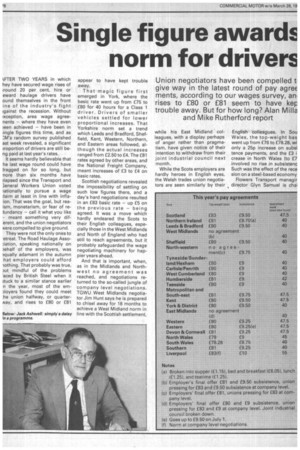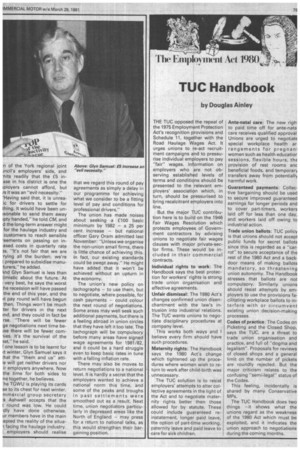Single figure awards norm for drivers
Page 80

Page 81

If you've noticed an error in this article please click here to report it so we can fix it.
Union negotiators have been compelled t, give way in the latest round of pay agre€ rnents, according to our wages survey, an rises to £80 or £81 seem to have kep trouble away. But for how long? Alan Milla
and Mike Rutherford report
kFTEH TWO YEARS in which hey have secured wage rises of iround 20 per cent, hire or eward haulage drivers have ound themselves in the front me of the industry's fight igainst the recession. Without !xception, area wage agreecents where they have even )een achieved have been in .ingle figures this time, and as :M's random survey published ast week revealed, a significant noportion of drivers are still beng paid at last year's rates.
It seems hardly believable that he last wage round could have iragged on for so long, but nore than six months have ?lapsed since the Transport and 3eneral Workers Union voted lationally to pursue a wage :laim at least in line with inflaion. That was the goal, but reaism, monetarism, or fear of reiundancy call it what you like meant something very diferect, and the union negotiators rvere compelled to give ground.
They were not the only ones to .etreat. The Road Haulage Asso;iation, speaking nationally on )ehalf of the employers, was .qually adamant in the autumn hat employers could afford lathing. That probably was true, )ut mindful of the problems 'aced by British Steel when it ;tuck to a similar stance earlier n the year, most of the em)loyers found they could meet he union halfway, or quarterway, and rises to £80 or £81
appear to have kept trouble away.
That magic figure first emerged in York, where the basic rate went up from £75 to £80 for 40 hours for a Class 1 driver, Drivers of smaller vehicles settled for lower proportional increases. That Yorkshire norm set a trend which Leeds and Bradford, Sheffield, Kent, Western, Northern, and Eastern areas followed, although the actual increases ranged from £2.50 to £4. The £81 rates agreed by other areas, and the National Freight Company, meant increases of £3 to £.4 on basic rates.
Scottish negotiations revealed the impossibility of settling on such low figures there, and a day's hard negotiations resulted in an £83 basic rate up £5 on the previous rate being agreed. It was a move which hardly endeared the Scots to their English colleagues, especially those in the West Midlands and North of England who had still to reach agreements, but it probably safeguarded the wage negotiating machinery for happier years ahead.
And that is important, when, as in the Midlands and Northwest no agreement was reached, and negotiations returned to the so-called jungle of company level negotiations. TGWU West Midlands negotiator Jim Hunt says he is prepared to chisel away for 18 months to achieve a West Midland norm in line with the Scottish settlement, while his East Midland colleagues, with a display perhaps of anger rather than pragmatism, have given notice of their intention to withdraw from their joint industrial council next month.
While the Scots employers are hardly heroes in English eyes, the Welsh trades union negotiators are seen similarly by their English colleagues. In Sou Wales, the top-weight bas went up from £76 to £78.28, wi only a 25p increase on subsi tence payments, and the £3 i crease in North Wales (to £7 involved no rise in subsistenc Such was the effect of the rece sion on a steel-based economy Flowers Transport managir director Glyn Samuel is chai
n of the York regional joint Ana's employers' side, and -nits readily that the £5 inase in his district is one the iployers cannot afford, but is it was an "evil necessity." 'Having said that, it is unreaic for drivers to settle for thing. It would have been unisonable to send them away ipty handed," he told CM, and d the long-term answer might for the haulage industry and customers to reach sensible wments on passing on inased costs in quarterly rate as. "It's not fair that we are rying all the burden; we're t prepared to subsidise manuturers," he added.
krd Glyn Samuel is less than timistic about the future, At i very best, he says the worst he recession will have passed the end of this year, and the d pay round will have begun then. Things won't be much ter for drivers in the next Ind, and they could in fact be rse. "There will be fewer ge negotiations next time beise there will be fewer cornlies. It's the survival of the est," he said.
F one lesson is to be learnt for d winter, Glyn Samuel says it :hat the "them and us" attile will get neither drivers nor ir employers anywhere. Now the time for both sides to ne together, he believes.
he TGWU is playing its cards se to its chest for next winter. mmercial group secretary :k Ashwell accepts that the t round was low. He could -dly have done otherwise. ar members have in the main :epted the reality of the situa
facing the haulage industry. : employers should realise that we regard this round of pay agreements as simply a delay in our programme for achieving what we consider to be a fitting level of pay and conditions for professional drivers."
The union has made noises about seeking a £100 basic minimum by 1982 — a 25 per cent increase — but national officer Gary Orem admitted last November: "Unless we organise the non-union small firms, there is little chance of achieving this. In fact, our existing standards could be swept away," He might have added that it won't be achieved without an upturn in the economy.
The union's new policy on tachographs — to use them, but to negotiate, where possible, for cash payments could colour the next round of negotiations. Some areas may well seek such additional payments, but there is a feeling abroad in union circles that they have left it too late. The tachograph will be compulsory before many areas have signed wage agreements for 1981/82, and it could be a hard struggle even to keep basic rates in tune with a falling inflation rate.
There may also be moves to return negotiations to a national level. It is hardly a secret that the employers wanted to achieve a national norm this time, and some of the peaks and troughs in past settlements were smoothed out as a result. Next time, union negotiators particularly in depressed areas like the North of England — may press for a return to national talks, as this would strengthen their bargaining position.
























































































































